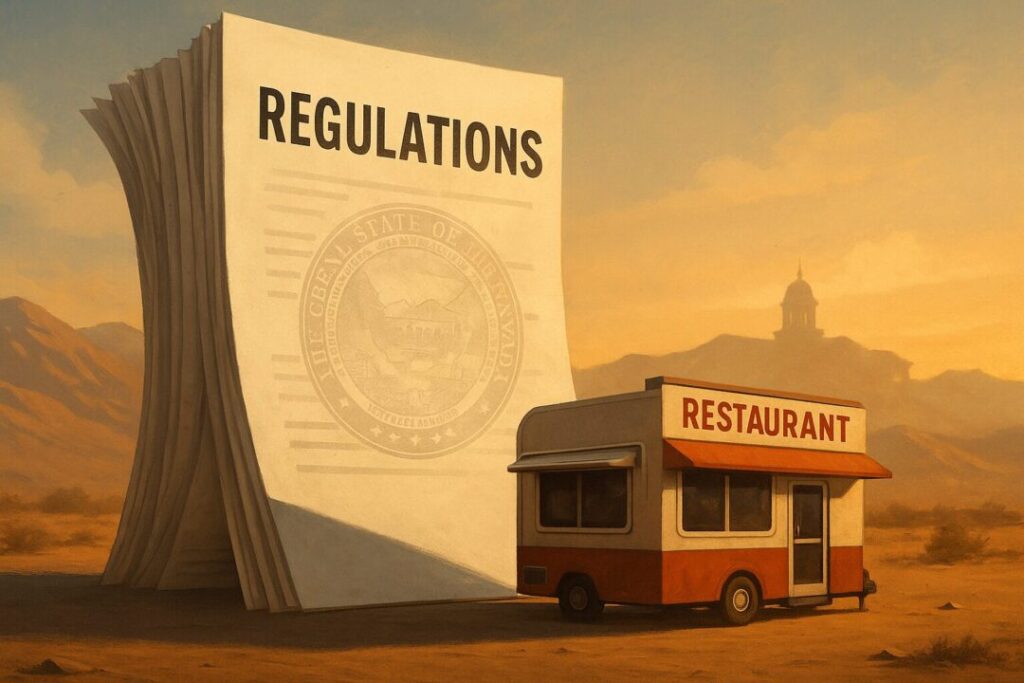(Anahit Baghshetsyan) – The 83rd legislative session of the Silver State concluded in June with over 500 bills getting signed into law by Gov. Joe Lombardo.
In the fast-paced four months of Carson City action, seemingly small potential new business burdens were frequently in the background. For Nevada business leaders, every new regulation can send the wrong message and make the process of entrepreneurship more difficult.
Below are Nevada Policy’s picks for the five worst bills that managed to become laws.
AB 116 – Red Tape for Ghost Kitchens
After the COVID pandemic, many small “ghost kitchens” emerged oriented toward food delivery platforms rather than in-house dining. Many customers continue to prefer this method of consumption.
However, this bill mandates that operators of a ghost kitchen obtain a local business license to operate or face costly new fines.
AB 116 is a great example of legislation that aims to root out bad actors but burdens an entire industry in the process.
SB 260 – Monitoring Air Quality for Employees
This bill requires the Division of Industrial Relations to adopt regulations that reduce employee exposure to poor air quality when the air quality index (AQI) reaches certain thresholds. It also requires all Nevada employers to establish a communication system to alert workers about poor air quality and allow employees to report exposure symptoms. The administrator must create regulations for implementing this communication system and set training standards for employers and employees to follow.
Every small business owner who employs more than 10 people has inherited a new compliance cost for additional trainings, communications systems, respiratory devices, and more as a result of this law.
This affects all employers regardless of whether their business creates any form of emissions—employers have no direct power over the AQI.
AB 244 – Ban On Polystyrene Containers
Beginning October 1, 2025, food establishments with 10 or more locations in Nevada, or with locations in other states that ban polystyrene, will be prohibited from using disposable foodware containers made wholly or partly from polystyrene foam. Violators will be subject to civil fines of up to $100 per day.
Smaller businesses operating only in Nevada are temporarily exempt, and all establishments may use up remaining inventory purchased before the effective date. By January 1, 2029, the ban will apply to all food establishments in the state, regardless of size or location.
AB 244 presents yet another costly micromanaging regulation for local chains and mom-and-pop shops.
SB 443 – Prevailing Wage Mandate for Private Contractors
In general, prevailing wage laws require contractors who bid on public works projects to pay union wages. SB 443 takes the unprecedented step of extending this requirement into the private sector.
It requires any contractor who is awarded a contract for construction work on a project commissioned by a public utility to also comply with prevailing wage provisions. Although “public utility” projects may sound like public works, utility companies are private businesses that are simply regulated by the state Public Utilities Commission and their land and building assets are private.
This new requirement could significantly raise the capital costs for utility companies, affect hiring practices, and delay completion timelines. Those costs and delays will in turn be passed onto ratepayers. Even more alarming, this change sets a new precedent that the legislature will force unionization onto private businesses.
AB 555 – Insulin Cost-Sharing Cap
This bill caps out-of-pocket costs for a 30-day supply of prescription insulin at $35 for many private health insurance plans, overriding existing cost-sharing rules. It allows the Insurance Commissioner to enforce this cap and penalize noncompliant insurers, including suspending or revoking their licenses.
This means that health insurance providers across the state will now need to shift their pricing strategies to shift any losses resulting from this price control onto other products and policyholders, wreaking even more havoc on the highly distorted pricing schemes in the healthcare sector.
These new laws all share a common thread: They are well-meaning on the surface but will carry obvious, even if unintended, negative consequences.
Nevada needs lawmakers to recognize that true solutions to social challenges are developed through innovation in the marketplace and informed by price signals. They should stop intervening in ways that impede this important process.
This article was originally published on NevadaBusiness.com. The opinions expressed by contributors are their own and do not necessarily represent the views of Nevada News & Views.



